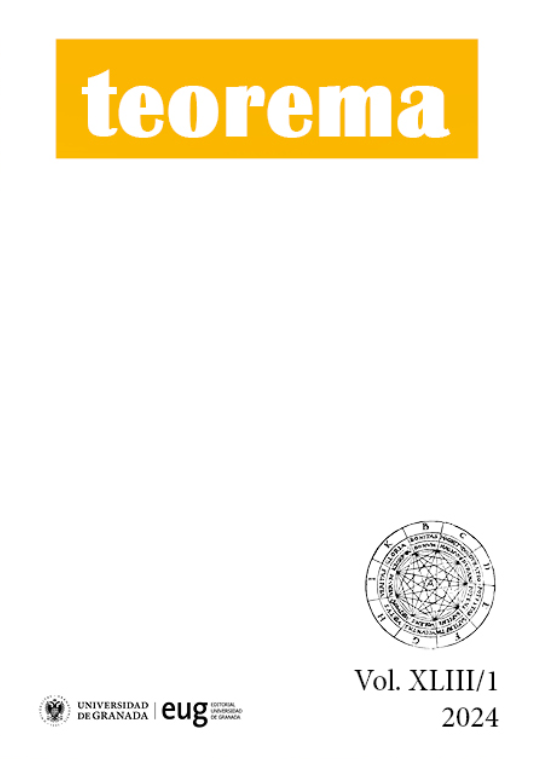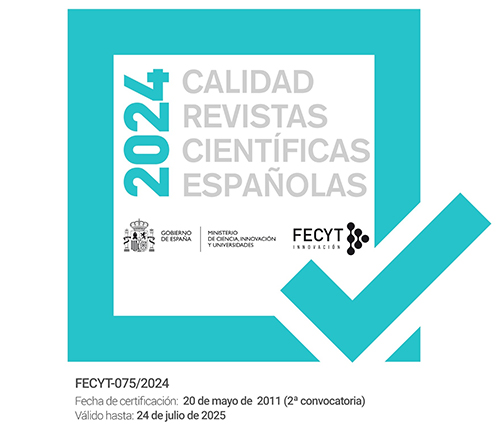How to Build an Epistemic Echo Chamber
DOI:
https://doi.org/10.30827/trif.34113Keywords:
echo chambers, epistemic groups, suboptimal equilibria, Condorcet's jury theoremAbstract
The present paper offers an explanatory model of the logical structure of epistemic echo chambers. Most work done so far on echo chambers attributes their cause to epistemic vice: they arise due to poor reasoning or cognitive biases. I argue that instead they are a predictable outcome of rational belief formation. They result from groups aggregating and magnifying the beliefs of their members, and the reflection of group consensus back to individuals who then increase their confidence to better conform with the group. This process is recursive, driving both individuals and epistemic groups to complete conviction. I also argue that not all echo chambers are bad. They are virtuous when they increase credence in the truth for those inside and inoculate them against the falsehoods, corrupt data, and fallacious reasoning outside the chamber. Echo chambers are bad when they start with falsehoods and amplify confidence in them.
Downloads
References
Aaronson, Scott (2005), ‘The Complexity of Agreement’, Proceedings of the Thirty-Seventh Annual ACM Symposium on Theory of Computing 634-43. DOI: https://doi.org/10.1145/1060590.1060686
——— (2015), ‘Common Knowledge and Aumann’s Agreement Theorem’, Shtetl-Optimized, https://www.scottaaronson.com/blog/?p=2410.
Asch, Solomon E. (1955), ‘Opinions and Social Pressure’, Scientific American, 193 (5), 31-35. DOI: https://doi.org/10.1038/scientificamerican1155-31
Aumann, Robert J. (1976), ‘Agreeing to Disagree’, The Annals of Statistics, 4 (6), 1236-39. DOI: https://doi.org/10.1214/aos/1176343654
Avnur, Yuval (2020), ‘What’s Wrong With the Online Echo Chamber: A Motivated Reasoning Account’, Journal of Applied Philosophy, 37 (4), 578-93. DOI: https://doi.org/10.1111/japp.12426
Baumgaertner, Bert (2014), ‘Yes, no, maybe so: a veritistic approach to echo chambers using a trichotomous belief model’, Synthese, 191, 2549-69. DOI: https://doi.org/10.1007/s11229-014-0439-9
Begby, Endre (2024), ‘From Belief Polarization to Echo Chambers: A Rationalizing Account’, Episteme, 21 (2), 519-539. DOI: https://doi.org/10.1017/epi.2022.14
Bond, Rod and Peter B. Smith (1996), ‘Culture and Conformity: A Meta-Analysis of Studies Using Asch’s Line Judgment Task’, Psychological Bulletin, 119 (1), 111-37. DOI: https://doi.org/10.1037//0033-2909.119.1.111
Boyd, Kenneth (2019), ‘Epistemically Pernicious Groups and the Groupstrapping Problem’, Social Epistemology, 33 (1), 61-73. DOI: https://doi.org/10.1080/02691728.2018.1551436
Brugnoli, Emanuele, et al. (2019), ‘Recursive Patterns in Online Echo Chambers’, Scientific Reports, 9. DOI: https://doi.org/10.1038/s41598-019-56191-7
Carnap, Rudolf (1959), ‘The Elimination of Metaphysics Through the Logical Analysis of Language’, in Ayer, A. J. (ed.), Logical Positivism (New York: The Free Press).
Carter, J. Adam and Fernando Broncano-Berrocal (2021), The Philosophy of Group Polarization, (London: Routledge). DOI: https://doi.org/10.4324/9781003023654
Christensen, David (2007), ‘Epistemology of Disagreement: The Good News’, Philosophical Review, 116 187-218. DOI: https://doi.org/10.1215/00318108-2006-035
——— (2009), ‘Disagreement as Evidence: The Epistemology of Controversy’, Philosophy Compass, 4/5 756-67. DOI: https://doi.org/10.1111/j.1747-9991.2009.00237.x
Dietrich, Franz and Kai Spiekermann (2020), ‘Jury Theorems’, in Fricker, Miranda, et al. (eds.), The Routledge Handbook of Social Epistemology (New York: Routledge), 386-96. DOI: https://doi.org/10.4324/9781315717937-38
Elzinga, Benjamin (2022), ‘Echo Chambers and Audio Signal Processing’, Episteme, 19 (3), 373-93. DOI: https://doi.org/10.1017/epi.2020.33
Estlund, David (2008), Democratic Authority: A Philosophical Framework, (Princeton: Princeton University Press). DOI: https://doi.org/10.1515/9781400831548
Fantl, Jeremy (2021), ‘Fake News vs. Echo Chambers’, Social Epistemology, 35 (6), 645-59. DOI: https://doi.org/10.1080/02691728.2021.1946201
Flynn, Morris R., et al. (2023), ‘Traffic Modeling— Phantom Traffic Jams and Traveling Jamitons’, https://math.mit.edu/traffic/.
Frances, Bryan and Jonathan Matheson (2019), ‘Disagreement’, in Zalta, Edward N. (ed.), The Stanford Encyclopedia of Philosophy (https://plato.stanford.edu/archives/win2019/entries/disagreement/.
Fujita, Yuki and Kazuo Mori (2017), ‘Group versus Individual Reward in the Asch Experiment without Confederates’, Open Journal of Social Sciences, 5 396-402. DOI: https://doi.org/10.4236/jss.2017.55027
Jackson, Elizabeth G. (2020), ‘The Relationship Between Belief and Credence’, Philosophy Compass, 15 (6), 1-13. DOI: https://doi.org/10.1111/phc3.12668
Jamieson, Kathleen Hall and Joseph N. Cappella (2010), Echo Chamber: Rush Limbaugh and the Conservative Media, (Oxford: Oxford University Press).
Lackey, Jennifer (2021a), ‘Echo Chambers, Fake News, and Social Epistemology’, in Bernecker, Sven, Amy K. Floweree, and Thomas Grundmann (eds.), The Epistemology of Fake News (Oxford: Oxford University Press), 206-27. DOI: https://doi.org/10.1093/oso/9780198863977.003.0010
——— (2021b), The Epistemology of Groups, (Oxford: Oxford University Press).
Licari, Peter R. (2020), ‘Sharp As a Fox: Are foxnews.com Visitors Less Politically Knowledgeable?’, American Politics Research, 48 (6), 792-806. DOI: https://doi.org/10.1177/1532673X20915222
List, Christian and Philip Pettit (2011), Group Agency: The Possibility, Design, and Status of Corporate Agents, (Oxford: Oxford University Press).
List, Christian (2014), ‘When to Defer to Supermajority Testimony—and When Not’, in Lackey, Jennifer (ed.), Essays in Collective Epistemology (Oxford: Oxford University Press), 240-49. DOI: https://doi.org/10.1093/acprof:oso/9780199665792.003.0011
Nguyen, C. Thi (2020), ‘Echo Chambers and Epistemic Bubbles’, Episteme, 17 (2), 141-61. DOI: https://doi.org/10.1017/epi.2018.32
Pettit, Philip (2006), ‘No Testimonial Route to Consensus’, Episteme, 3 (3), 156-65. DOI: https://doi.org/10.3366/epi.2006.3.3.156
Ranalli, Christopher and Finlay Malcolm (2023), ‘What’s So Bad About Echo Chambers?’, Inquiry, forthcoming . DOI: https://doi.org/10.1080/0020174X.2023.2174590
Sunstein, Cass R. (2006), Infotopia: How Many Minds Produce Knowledge, (Oxford: Oxford University Press). DOI: https://doi.org/10.1093/oso/9780195189285.001.0001
Tanis, Martin and Tom Postmes (2005), ‘A Social Identity Approach to Trust: Interpersonal Perception, Group Membership, and Trusting Behavior’, European Journal of Social Psychology, 35 413-24. DOI: https://doi.org/10.1002/ejsp.256
Yudkowsky, Eliezer (2017), Inadequate Equilibria: Where and How Civilizations Get Stuck, (Berkeley, CA: Machine Intelligence Research Institute).
Downloads
Published
How to Cite
Issue
Section
License
Copyright (c) 2025 Steven Hales

This work is licensed under a Creative Commons Attribution-NonCommercial 4.0 International License.













